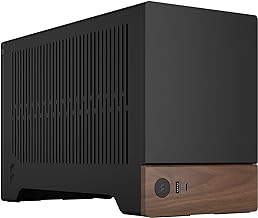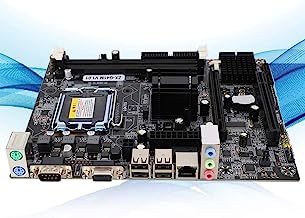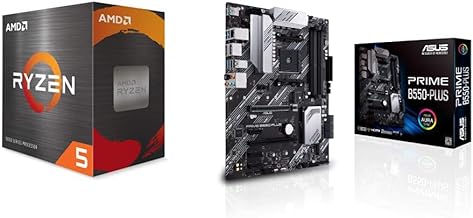5 important factors worth considering when looking for the best mother boards
When building a custom PC, the motherboard is like the heart of the system. It plays a big role in how well your computer runs and how easy it is to upgrade later on. When picking a motherboard, you’ll want to think about things like what kind of CPU it works with and how many slots you have for adding extra parts. We’ll talk about the most important things to think about when buying a motherboard in order to have a smooth and fast computer experience.
See our guide to the best mother boards.
Compatibility with CPU
When building a PC, it’s important to make sure the motherboard and CPU are compatible. This connection can greatly affect how well your system performs. If the motherboard and CPU don’t work well together, you may experience slow performance, unexpected shutdowns, or they may not work at all. That’s why it’s crucial to choose a motherboard that not only works with your CPU model but also allows it to perform at its best.
The relationship between a motherboard and CPU is like a dance – they need to work together perfectly to create smooth performance. While a fancy, high-end motherboard may seem like a good choice, if it doesn’t match your CPU’s specifications, you could be limiting its capabilities. In the world of PC building, compatibility is key. Taking the time to research and choose the right pairing can greatly enhance your computing experience.
Number of RAM slots
When you’re thinking about how many RAM slots are on a motherboard, it’s important to look ahead. Choosing a motherboard with more RAM slots may cost more at first, but it sets you up for upgrades and better performance in the future. Having extra RAM slots gives you more options for upgrading your system down the road. As technology gets better and software gets more demanding, being able to add more RAM without getting a whole new motherboard is really helpful. It not only keeps your system working well in the future, but also lets you improve performance without a lot of trouble or money.
Also, a motherboard with several RAM slots lets you do more tasks at once. By adding more RAM modules, you can spread out the work better across different parts of your system, which makes everything run more smoothly and quickly. Whether you’re a gamer who wants to run multiple programs at the same time or a professional dealing with big tasks, having room for more RAM can really boost your productivity and overall experience. Basically, choosing motherboards with more RAM slots isn’t just about now; it’s an investment in making your system work better in the long run.
Expansion slots
When it comes to buying motherboards, it’s important to think about expansion slots. These slots allow you to unlock your system’s full potential by giving you options to upgrade and customize. Whether you want to add a graphics card for gaming or more storage for your media, expansion slots are crucial for upgrading your system and keeping up with technology.
Choosing a motherboard with lots of expansion slots can help future-proof your setup and make sure it stays up to date as technology advances. Expansion slots are like the foundation of your system, giving you the freedom to upgrade and improve your setup. Whether you’re a seasoned expert or just starting out, expansion slots allow you to push the limits and explore new possibilities.
In short, expansion slots are essential when choosing a motherboard because they help bridge the gap between your current setup and the endless opportunities for future technological advancements.
I/O ports
When you’re thinking about buying a motherboard, it’s important to consider the variety of I/O ports it has available. These ports are essential for connecting different devices to your computer and can impact how well your system works. From USB ports for connecting external devices to audio jacks for better sound quality, the I/O ports you choose can either make things easier for you or make things harder. You should think about what you need and what you prefer when it comes to I/O ports, so you can make sure the motherboard you pick fits with how you plan to use it.
If you don’t pay enough attention to the I/O ports, you might end up facing frustrating limits and having to buy additional adapters or expansion cards later on. Choosing a motherboard with a good variety of I/O ports can help you be ready for new devices and technologies as they come out. Whether you care more about fast data transfer, good sound connections, or having multiple display options, a motherboard with lots of I/O ports can improve your current setup and help you keep up with new technology as it develops. In the end, getting a motherboard with a wide range of I/O ports can make your computer experience better and make sure you’re ready for any task or entertainment need that might come up.
Form factor
When you’re choosing a motherboard, the form factor is an important aspect that can affect your overall computing experience. The form factor determines the physical size, layout, and connections of the motherboard, which can impact how well it works with other parts. Picking the right form factor ensures that the motherboard fits in your PC case and affects how much you can upgrade and how your system looks. Whether you want a small build with limited upgrades or a larger one with room to grow, choosing the right form factor is key to making your system work for you.
The form factor also affects how well your system runs. Smaller form factors, like Mini-ITX, may look sleek and save space but could limit your options for adding more parts, like extra RAM or multiple GPUs. Larger form factors, like ATX or E-ATX, provide more space for upgrades and better cooling, which can lead to a more powerful and future-proof system. So, considering the form factor along with other technical details is important for creating a balanced and optimized system that fits your needs and preferences.
Conclusion
Motherboards are like the unsung heroes of computer hardware. They bring electronic devices to life by connecting all the different parts together. Think of them as the backbone of a computer, coordinating all the different functions that make our digital world work. By managing the flow of data and power, motherboards play a key role in keeping everything running smoothly.
Every computer is like a symphony orchestra, with the motherboard as the conductor. It brings together all the different components, making sure they work together seamlessly. From powering up the computer to transferring data quickly, motherboards are responsible for keeping everything running smoothly.
In today’s fast-paced world of technology, motherboards are more important than ever. They play a crucial role in shaping our computing experience, making sure everything runs efficiently and connects seamlessly. Without them, our devices wouldn’t be able to perform at their best. Want more info on dtf film, check the best dtf film.


